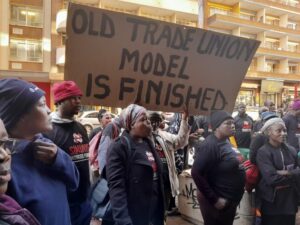“We’re sitting with rubbish here and it’s been over three weeks, almost a month now. We don’t know what happened with the waste collectors, we didn’t get any notice if they are on strike or their refuse trucks are not working. The filth is piling up and causing an unbearable smell for us,” said community leader Mandla Ntombela.
Besides the bad stench in Extension 2, Ntombela said they feared getting sick from the filth that surrounds their houses. “Our kids play near the rubbish. At times, they will kick a ball inside the filth and go to dig it out by hand; that is a health risk. It is concerning because this is a busy area in Diepsloot, where informal traders also run their businesses. It should not be filthy,” said Ntombela.
When taking a walk around the area, you will see rubbish piling up on almost every corner in Diepsloot Extension 2, near the taxi rank and another pile near the library. The rubbish near the Ext 2 bridge is strewn all over the place.
An informal trader we spoke to, who asked to remain anonymous, said the rubbish was affecting her business. “I am also losing confidence as a trader. The smell is so bad sometimes that customers refuse to sit and eat. I sell cooked meals and the smell gets unbearable especially when it’s hot. Flies are a popular sight here. Before I would try and sweep the rubbish away, but now I am defeated as people keep dumping all kinds of filth: used nappies, stale food and rotten meat. It is sickening but I persevere for my business,” the woman told Elitsha.
According to residents, rubbish was being cleared every two days before, but the Pikitup truck has not been seen in the past three weeks.
Shantelle Kekana said illegal dumping and poor refuse collection is an old issue in Diepsloot. She said for the past ten years or more the city has failed in managing waste in the township. “This place is like a forgotten place actually. The City of Joburg has continuously failed us. For the past 10 years, we have been having this problem but sometimes it’s better and then it gets worse. We are suffocating in filth here, rubbish is a part of our lives and we cannot escape it. The most sad part is that some people don’t even put their rubbish in containers; they throw it like it is.”
According to Ntombela, most areas are affected by this but not a single person knows why they are stuck with uncollected refuse. “We don’t know which door we should knock on so that the rubbish can be collected. There are many illnesses out there and we cannot tolerate this for a long time; it is too much now,” he added. He said the ward councillor has not yet spoken about the problem and residents have still to approach him to find out why refuse is not being collected.
South African National Civic Organisation (Sanco) chairperson and former ward 95 councillor, Kate Matlala said the uncollected rubbish is of great concern. “I have seen the rubbish as well, even yesterday as I was walking about in Diepsloot Extension 2. We need to have it addressed. When I was councillor, I used to have regular clean-up campaigns so that we could keep the area clean when Pikitup fails to do its work. As Sanco, we will sit down with the current councillor and find a way of resolving the rubbish problem,” said Matlala.
She is wary of approaching the current councillor of Diepsloot, however, because it could be seen as if she is trying to take over. “But it is really bad, in almost every street, piling rubbish greets you. People should not live like pigs,” said Matlala.
The current ward 95 councillor, Julius Maake said he cannot comment on the matter and asked that any questions be referred to Johannesburg mayor, Mpho Phalatse. “The rubbish is irritating me too, I have been trying to address it and I am tired. Put all questions to the mayor,” said Maake.
Pikitup spokesperson, Muzi Mkhwanazi said, “A fleet contract came to an end on the 31st of October 2022 and there are still logistical delays in implementing a new contract. As a result waste collection has been affected.” While they are still dealing with this, he urged residents to refrain from dumping waste illegally.





